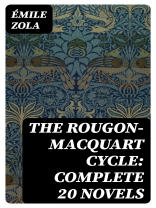Émile Zola’s ‘The Rougon-Macquart Cycle’ is a monumental series of twenty novels that intricately explores the lives of the Rougon and Macquart families against the backdrop of the Second Empire in France. Using a naturalistic literary style, Zola meticulously intertwines social commentary with rich character development, vividly illuminating the influences of heredity and environment on humanity. Each novel within the cycle serves as a standalone narrative yet contributes to the overarching themes of deterministic philosophy, social class struggles, and the impact of industrialization on human life. Zola, a leading figure in the Naturalism movement, drew heavily from his own experiences and observations of contemporary society. His background as a journalist and a keen advocate for social reform deeply informed his writing. The Rougon-Macquart Cycle reflects Zola’s commitment to portraying reality unflinchingly, allowing him to address prevailing social issues such as poverty, alcoholism, and the working class’s plight, as well as the moral complexities of human behavior. This comprehensive collection is highly recommended for readers seeking a profound understanding of 19th-century French society, as well as for those fascinated by the psychological intricacies of human experiences. Zola’s masterful prose and the cycle’s ambitious scope makes it an essential read for students and enthusiasts of literature, history, and social sciences alike.
关于作者
Émile Zola (1840-1902) stands among the most influential figures in French literature, a towering presence in the development of naturalism, a literary movement that revolutionized narratives through a scientific approach to human behavior and sociopolitical critique. Born in Paris, Zola’s legacy is tied largely to his ambitious 20-novel series, ‘The Rougon-Macquart Cycle’, which unflinchingly examines the impact of environment and heredity across generations of a single family during the Second French Empire. His vivid portrayals of society’s underbelly and his dissections of greed, corruption, and the human struggle garnered both acclaim and controversy. Notable novels from the series, such as ‘Germinal’, ‘Nana’, and ‘L’Assommoir’, demonstrate Zola’s powerful realism and commitment to social critique, making these texts essential for understanding the conditions of the working class and the social changes of 19th-century France. As a literary figure, Zola’s meticulous attention to detail and scientific method in literature set benchmarks for modern analytic and investigative approaches in writing. Beyond literature, Zola’s life was marked by his infamous involvement in the Dreyfus Affair, wherein his open letter ‘J’accuse…!’ not only demonstrated his zeal for justice but also highlighted the role of the public intellectual. Zola’s work offers an intricate tapestry of French life, and his contributions to both the literary arts and social thought remain enduring subjects of study and admiration.












